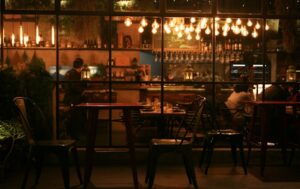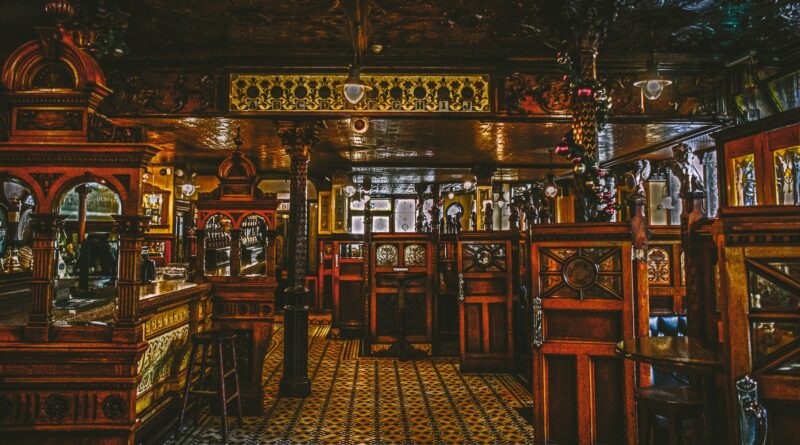Why Not the Pub? Rethinking UK Bars as Accessible Learning Environments
Why Not the Pub? Rethinking UK Bars as Accessible Learning Environments
Sheng-Hsiang Lance Peng
“Are you working?” the bartender asked, a bit bemused as I set down my pint next to my laptop. I nodded sheepishly and smiled, realising I’d become that person: the oddball at the bar tapping away at their thesis rather than sipping a lager and watching the footie.
And that’s the point.
This isn’t a manifesto to turn every UK pub into a coworking space. I’m not here to replace crisps with coursework or suggest that anyone swap pints for PowerPoint. UK bars serve a really rooted cultural role as social hubs, third places and sites of relaxation, laughter and (often messy) community. But after weeks of hopping between libraries and cafés (some packed, others shutting early or refusing laptops) I found myself quietly wondering: Why not the pub?
So I conducted a little social experiment. Nothing scientific, just personal. I started casually bringing my laptop to UK bars in the early afternoon: off-peak hours, ideally with decent Wi-Fi and a half-decent pint. My aim? To find out what would happen if I treated the bar as a legitimate informal learning space. What I found was a mix of surprise, curiosity, the occasional stare and a whole lot of possibility.
—Information behaviour doesn’t just happen in libraries or institutions. Why not the pub?—
Pubs as Third Places
Urban sociologist Ray Oldenburg coined the term third place to describe social environments that are neither home (first place) nor work (second place): spaces like cafés, barber shops or yes, pubs, where community life unfolds informally. Pubs in the UK are among the most enduring and accessible third places and unlike some libraries or cafés that can feel classed, surveilled, commercially exclusive, bars are often more relaxed, more local and (crucially!) more welcoming to a range of bodies and behaviours.
Despite this, you rarely see anyone open a laptop in a bar. And when you do, you get looks. Trust me I saw them. That subtle glance, the raised brow, the unspoken what are they doing here? It’s not hostile but it’s enough to remind you that even in “inclusive” spaces, social norms dictate how we behave and who belongs doing what.
Information Norms and Public Space
 This is where information science gets interesting. Scholars like Reijo Savolainen have explored everyday life information seeking (ELIS), showing that information behaviour doesn’t just happen in libraries or institutions; it happens on buses, in parks, in queues, in pubs. But these behaviours are shaped by spatial and social norms. What counts as “appropriate” information work in one place (typing at a café) may feel transgressive elsewhere (typing in a pub).
This is where information science gets interesting. Scholars like Reijo Savolainen have explored everyday life information seeking (ELIS), showing that information behaviour doesn’t just happen in libraries or institutions; it happens on buses, in parks, in queues, in pubs. But these behaviours are shaped by spatial and social norms. What counts as “appropriate” information work in one place (typing at a café) may feel transgressive elsewhere (typing in a pub).
When I sat with my laptop and my pint, I was disrupting those norms (even slightly) and my presence said: “Learning can happen here too”. And that disruption made visible the invisible geographies of knowledge work: where it’s allowed, where it’s expected, where it’s quietly discouraged.
Digital and Mobile Information Work
The way we work and learn has changed dramatically. With cloud storage, collaborative tools and lightweight laptops, knowledge production no longer needs a fixed desk or library carrel. We are, as sociologist Barry Wellman suggests, part of a world of networked individualism, where mobility and flexibility are key.
Yet even as the tech enables work from anywhere, cultural scripts lag behind. We valorise the student hunched over a MacBook in a softly lit café but not the same student perched at the corner of a Wetherspoons. The devices are the same, the intention is the same but the setting changes how the act is read.
This matters, especially for students and workers from non-traditional backgrounds. Not everyone can afford an artisanal £4 coffee for every study session or access libraries that close at 5pm. Bars, with their more flexible hours and lower drink prices, can serve as radically inclusive alternatives….if we can shift how we imagine their function.
Stares but No Trouble
I never felt unsafe. The stares were curious, not hostile. Sometimes I got questions (usually from bartenders or regulars) “What are you up to?”, “Are you revising?” Once or twice, someone struck up a chat about their own time in uni. These interactions were never intrusive; in fact they broke the isolation that often defines academic labour.
But still, the feeling of not quite belonging lingered. That’s the invisible weight of social norms in public space. My body, my laptop, my presence slightly misaligned with the expected script. And yet, I kept going. Because the more I showed up, the less strange it felt.
Not a Replacement, but an Expansion
I’m not suggesting we convert pubs into libraries or fill every table with silent students instead of laughing locals. That would erase the vital role these places play as cultural, social, emotional sanctuaries. But we can expand our understanding of what a “learning environment” looks like. We can challenge the idea that studying or information work must happen in designated, often exclusionary, places.
As theorist Gloria Anzaldúa reminds us, knowledge production doesn’t just occur in the academy; it happens in borderlands, in hybrid spaces, in acts of everyday resistance and creativity. The bar, paradoxically, can be one such borderland.
So What? Final Sip
Normalising bars as occasional study spaces isn’t about chasing productivity hacks or romanticising laptop-in-a-leather-booth aesthetics. It’s about unsettling dominant geographies of knowledge and asking: where can learning live? It’s about acknowledging that studying isn’t always a solitary or sterile act; it can be social, sensory, even pleasurable. Learning might just thrive amidst the low buzz of conversation, the clink of pint glasses, the spill and hum of everyday life.
In reimagining the pub as a potential study site, we begin to challenge entrenched boundaries between leisure and labour, formal and informal learning. For the part-time student, the shift worker, the chronically distracted or the neurodivergent learner who prefers ambient environments and low-pressure atmospheres: why shouldn’t the pub be folded into their learning ecology?
Next time you pass someone hunched over a laptop with a half-drunk cider, consider that they may not be out of place; they may be performing a kind of ambient scholarship. They might be resisting spatial hierarchies of where learning is “supposed” to happen. They may be engaging in a low-key reterritorialisation of public space through everyday acts of informational labour.
In a world increasingly shaped by mobile devices, flexible work cultures and cloud-based collaboration, learning becomes fluid, portable interstitial. The pub then, is not a distraction from study; it is a liminal space within a broader networked learning ecology, where knowledge production is both embodied and distributed.
These blurred practices reflect the broader shift toward doing information work anytime, anywhere: where people curate their own environments for thinking, learning and connecting, often beyond institutional walls. As the boundaries of informational labour continue to dissolve, perhaps it’s time we recognise the pub not just as a place to wind down but also as a place to log in.
So I’ll ask it once more with a wink and a wifi password: Why not the pub?
Cite this article in APA as: Peng, S-H. L. (2025, July 30). Why not the pub? Rethinking UK bars as accessible learning environments. Information Matters. https://informationmatters.org/2025/07/why-not-the-pub-rethinking-uk-bars-as-accessible-learning-environments/
Author
-
Dr Peng is a Cornwall-based researcher (Falmouth/Exeter). His research explores a phantasmagoria of marginalised experiences through eerie and unsettling lenses including hauntology (Derrida), monster culture (Cohen) and mnemohistory (Assmann) to reflect on the cultural and social conditions shaping them.
View all posts





